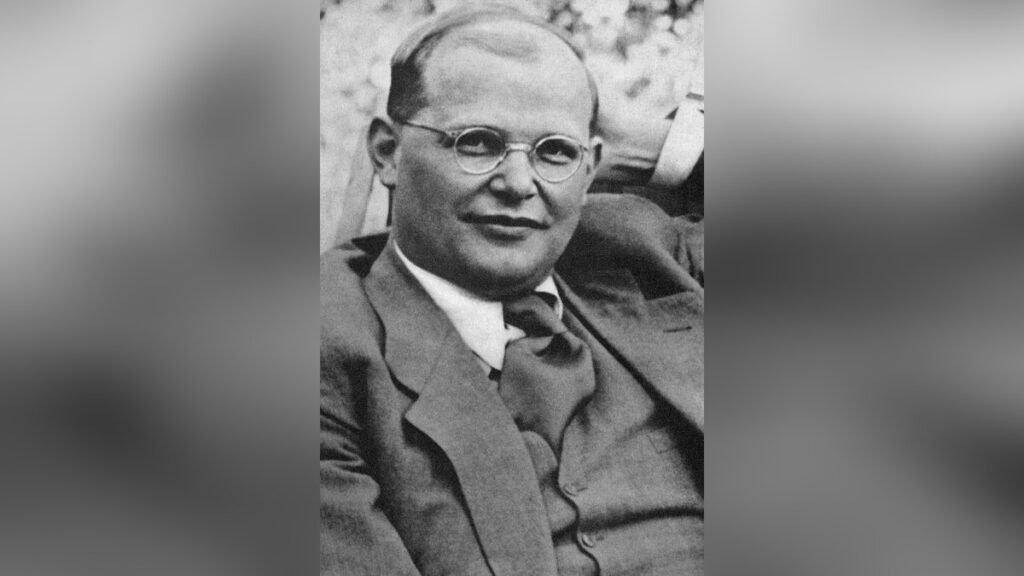Dietrich Bonhoeffer’s Theory of Stupidity offers us a way to understand the “hold” MAGA has over so many people. It is important to note at the outset that by “stupidity” he does not mean “dumb.” Rather than a lack of intelligence, he was describing a psychological state where facts don’t matter, where contradictions aren’t recognized, and where reality itself becomes secondary to the prevailing social environment.
Ringing any bells?
What Bonhoeffer observed had little to do with intelligence or education; it’s about something more dangerous, more insidious, and unfortunately more relevant today than ever before.

Dietrich Bonhoeffer was a German Lutheran pastor and theologian who spoke out against the Nazis and was imprisoned for it first at Tegel Prison and then at Flossenbürg concentration camp. At dawn on April 9, 1945, he was stripped of his clothing and led naked into the execution yard where he was executed by hanging, at the age of 39, a mere 14 days before the 90th US Infantry Division of the Allied Army liberated Flossenbürg.
He wrote an essay on the 10th anniversary of Hitler coming to power exploring why seemingly decent people participated in or stood by during the atrocities of the Third Reich.
His conclusion was that stupidity is a far more dangerous enemy of the good than malice or evil. He argued that against stupidity we are powerless. We can protest evil; we can reason against it and even use force in an effort to stop it. But when it comes to stupidity, protest and force are ineffective – they accomplish nothing, and reason falls on deaf ears.
For Bonhoeffer, stupidity is a sociological condition; it’s not biological and it’s not genetic. And, importantly, it’s not tied to or affected by a person’s IQ – in fact, he suggested highly intelligent people are often more susceptible to being caught up in stupidity, which for him was defined as a state where individuals surrender their critical thinking to external powers, movements, leaders, or to the crowd. Stupidity arises from a desire to find security in something external – people become intoxicated by the mass movement and are swept along by its momentum, incapable of thinking on their own.
The person in this state cannot be reached with rational argument: facts bounce off them and logic fails to penetrate their cocoon. They’ve entered a closed system of thought that’s self-reinforcing and satisfying. Think for a moment about conversations you’ve had where no matter what evidence you present the other person simply won’t engage with it. They either reject it outright or incorporate it into their existing world view; they cannot and will not question their position or examine it. This is what Bonhoeffer means by stupidity.
How does one fall into this state? It begins when a person surrenders their independence of mind in an effort to find security in numbers or authority. They want to belong, to be part of something bigger than themselves. I should point out there’s nothing necessarily wrong with that – humans are social beings by nature and want to belong. But Bonhoeffer warns that when we let this desire override our critical faculties, we open ourselves up to manipulation. Then comes the group’s over-arching narrative: a way of seeing the world that explains everything which must be accepted to gain, and maintain, group membership. These narratives are extremely seductive because they offer a simple binary way to see the world: they divide it into good and evil, us and them, right and wrong.
American “patriots” who love the flag and our country vs. immigrants, LGBTQ+ people, minorities, Muslims, liberals, etc.
Once accepted, this narrative becomes a filter through which all information passes. Evidence supporting it is amplified and contradictory evidence is dismissed or reinterpreted – a process known as “confirmation bias.” For the “true believer,” the complex, messy world becomes neat and coherent, but at the cost of truth. Bonhoeffer wrote:
The fact that the stupid person is often stubborn must not blind us to the fact that he is not independent. In conversation with him, one virtually feels that one is dealing not at all with a person, but with slogans, catchwords and the like, that have taken possession of him. He is under a spell, blinded, misused, and abused in his very being.
What is particularly disturbing about Bonhoeffer’s theory is that intelligence offers no protection against this slide into an alternative universe; in fact, he suggests intelligent people may be more vulnerable because they’re better able to rationalize contradictions and defend indefensible positions.
This leads us to perhaps the most chilling aspect of Bonhoeffer’s theory – the connection between stupidity and power. Bonhoeffer observed that the rise of certain political movements seemed to increase the prevalence of this type of stupidity. In his opinion, these movements didn’t just exploit existing stupidity but actively manufactured it. He wrote:
Upon closer observation, it becomes apparent that every strong upsurge of power in the public sphere, be it of a political or of a religious nature, infects a large part of humankind with stupidity. It would even seem that this is virtually a sociological-psychological law.
How does this happen? According to Bonhoeffer, powerful movements…
- offer simple explanations for complex problems reducing the need for difficult thought
- they create social environments where conformity is rewarded, and independent thinking is punished
- they engage the emotions, particularly fear, anger, and pride, which overwhelm rational thought once a person falls under the sway of such a movement
Once their critical faculties are compromised, Bonhoeffer suggests “true believers” become victims. It’s not that they can’t judge right from wrong, they’ve surrendered to an external authority, they have outsourced their judgement.
And here I should point out that Bonhoeffer wasn’t discussing a partisan phenomenon; rather, he suggested this can happen anywhere on the political spectrum (from Right to Left), in any religion, and/or in any society; no group and nobody is immune.
Which brings us to the critical question of what, if anything, can be done and is to be done. If education and information aren’t enough to combat stupidity, what is it that Bonhoeffer believed was the antidote? Or are we doomed?
For him, the answer was liberation: the stupid person must be liberated from their condition. But how? Bonhoeffer suggested that liberation required an internal awakening that couldn’t be forced from the outside but had to arise from within.
Crucially, this is why he believed that we must approach the problem of stupidity differently than we approach something like evil: while evil requires opposition, stupidity requires healing. To his way of thinking, it’s not about defeating an enemy but recovering a person who has lost their way.

The rise of MAGA makes Bonhoeffer’s theory incredibly relevant today. But the first step in breaching the divide between Americans is to self-examine, as none of us are immune to falling under stupidity’s sway: we should begin by asking ourselves whether we have surrendered our independent judgment to any group leader or ideology, and then ask:
- do I consider evidence that contradicts my beliefs?
- am I willing to change my mind when the facts demand it?
The main takeaway from Bonhoeffer’s theory is the need for us to engage differently with those caught up in stupidity: to see that argumentative conversations won’t reach people who have been caught in stupidity’s grip – such debate might even cause them to entrench themselves further. Instead, we should focus on creating environments where independent thought is safe and valued, and where questions are welcomed rather than punished.
The danger of stupidity, as Bonhoeffer saw it, isn’t from the malicious few, the so-called ring leaders, it’s from the many who abandon the responsibility of thinking for themselves.
